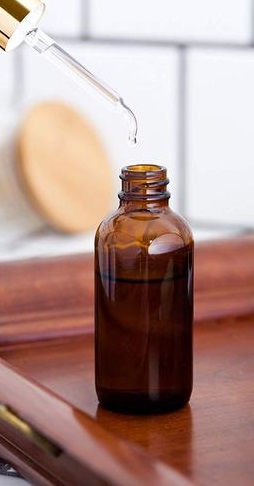Boston round (bottle)
Boston round bottles, often simply referred to as Boston rounds, are a type of glass bottle characterized by their rounded shoulders and cylindrical shape. The design is a classic and versatile one, making these bottles popular across a variety of industries, including pharmaceuticals, cosmetics, and home brewing. The origin of the name is not well-documented, but it is widely assumed to be linked to the city of Boston, Massachusetts, due to its historical association with the pharmaceutical and chemical industries.
Design and Features[edit | edit source]
Boston round bottles are distinguished by their unique design, which includes a rounded shoulder and a broad base. This shape not only contributes to the aesthetic appeal of the bottle but also enhances its durability and stability. The bottles typically come with screw-on caps, which can be made of various materials such as plastic, metal, or glass itself. The neck of the bottle is designed to accommodate standard closure sizes, making it easy to seal and reseal the contents.
Materials[edit | edit source]
While traditionally made from glass, Boston round bottles can also be found in plastic materials like polyethylene terephthalate (PET) and high-density polyethylene (HDPE). Glass Boston rounds are preferred for storing essential oils, chemicals, and medications due to their inert nature, which ensures that the contents do not react with the container. Plastic Boston rounds offer the advantage of being lightweight and less prone to breaking, making them suitable for products that need to be transported frequently.
Uses[edit | edit source]
Boston round bottles are highly versatile and used in a variety of fields:
- In the pharmaceutical industry, they are used to store and dispense liquid medications, thanks to their chemical resistance and the tight seal provided by their caps.
- Essential oil producers favor glass Boston rounds because they protect the oils from UV light, preserving their properties.
- The cosmetic industry uses these bottles for packaging serums, lotions, and other liquid beauty products.
- They are also popular in home brewing and DIY projects for storing homemade concoctions.
Sizes and Colors[edit | edit source]
Boston round bottles come in a range of sizes, from small 1-ounce bottles suitable for samples or travel-sized products, up to larger sizes for bulk storage. The color of the glass can vary, with clear, amber, and cobalt blue being the most common. Amber and cobalt blue glass bottles offer the added benefit of filtering out UV light, which can degrade or alter the contents of the bottle.
Environmental Impact[edit | edit source]
The choice between glass and plastic Boston rounds can have implications for the environment. Glass is infinitely recyclable and does not degrade in quality over time, making it a more sustainable option. However, the production and transportation of glass bottles require more energy compared to plastic. Plastic bottles, while less energy-intensive to produce and transport, contribute to plastic pollution if not properly recycled.
Conclusion[edit | edit source]
Boston round bottles are a staple in many industries due to their practical design, durability, and versatility. Whether made from glass or plastic, these bottles serve a wide range of purposes and are a testament to the enduring popularity of a simple yet effective design.
Search WikiMD
Ad.Tired of being Overweight? Try W8MD's physician weight loss program.
Semaglutide (Ozempic / Wegovy and Tirzepatide (Mounjaro / Zepbound) available.
Advertise on WikiMD
|
WikiMD's Wellness Encyclopedia |
| Let Food Be Thy Medicine Medicine Thy Food - Hippocrates |
Translate this page: - East Asian
中文,
日本,
한국어,
South Asian
हिन्दी,
தமிழ்,
తెలుగు,
Urdu,
ಕನ್ನಡ,
Southeast Asian
Indonesian,
Vietnamese,
Thai,
မြန်မာဘာသာ,
বাংলা
European
español,
Deutsch,
français,
Greek,
português do Brasil,
polski,
română,
русский,
Nederlands,
norsk,
svenska,
suomi,
Italian
Middle Eastern & African
عربى,
Turkish,
Persian,
Hebrew,
Afrikaans,
isiZulu,
Kiswahili,
Other
Bulgarian,
Hungarian,
Czech,
Swedish,
മലയാളം,
मराठी,
ਪੰਜਾਬੀ,
ગુજરાતી,
Portuguese,
Ukrainian
Medical Disclaimer: WikiMD is not a substitute for professional medical advice. The information on WikiMD is provided as an information resource only, may be incorrect, outdated or misleading, and is not to be used or relied on for any diagnostic or treatment purposes. Please consult your health care provider before making any healthcare decisions or for guidance about a specific medical condition. WikiMD expressly disclaims responsibility, and shall have no liability, for any damages, loss, injury, or liability whatsoever suffered as a result of your reliance on the information contained in this site. By visiting this site you agree to the foregoing terms and conditions, which may from time to time be changed or supplemented by WikiMD. If you do not agree to the foregoing terms and conditions, you should not enter or use this site. See full disclaimer.
Credits:Most images are courtesy of Wikimedia commons, and templates, categories Wikipedia, licensed under CC BY SA or similar.
Contributors: Prab R. Tumpati, MD

